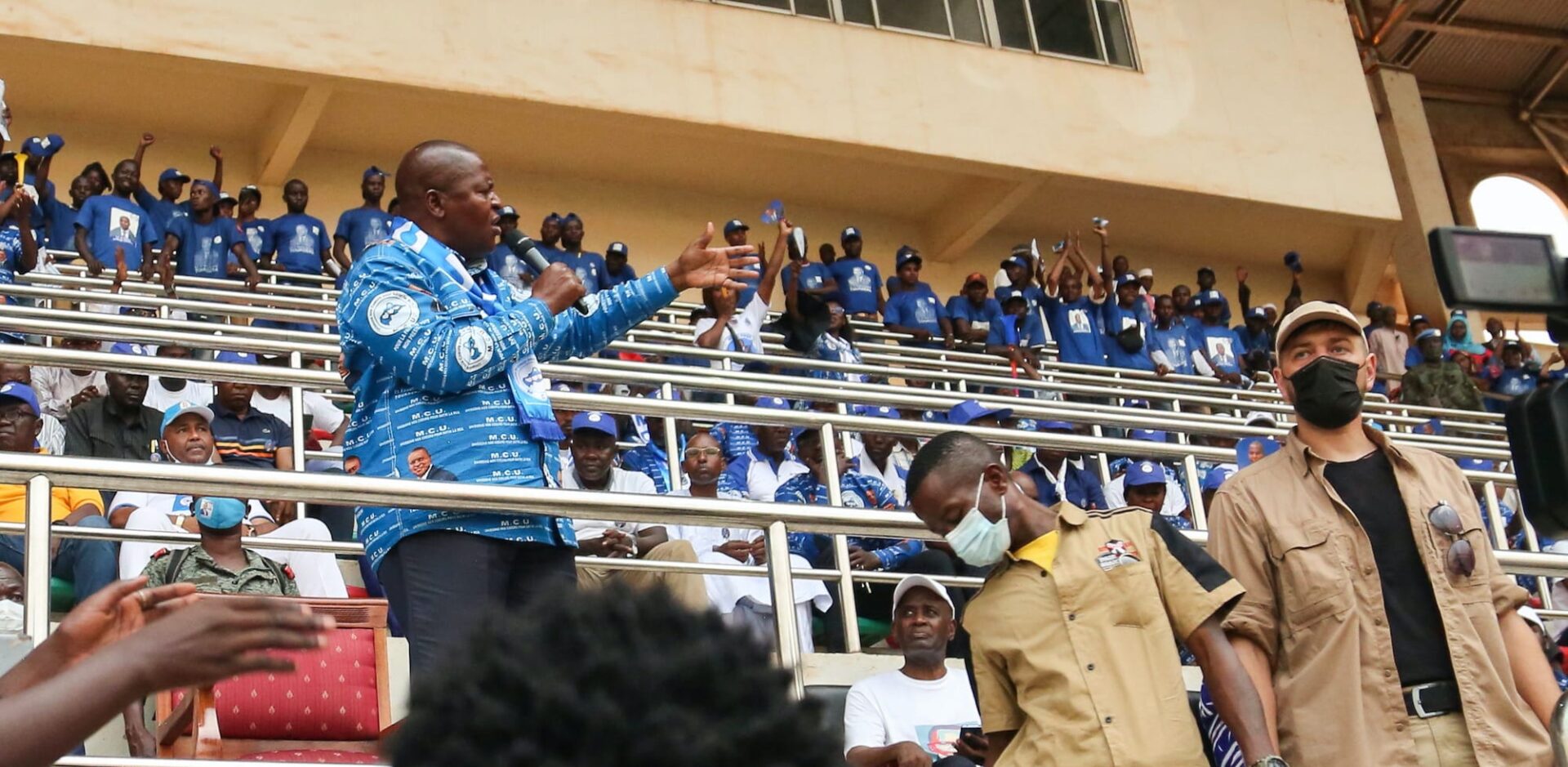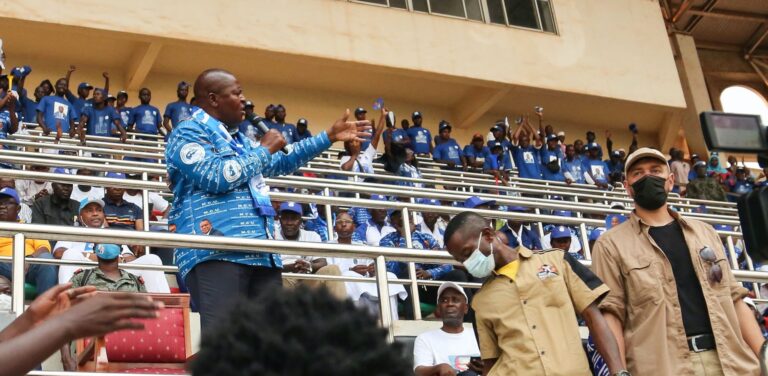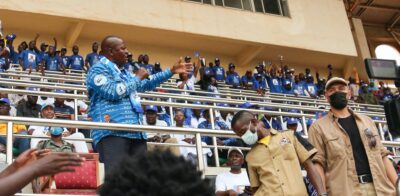An organisation with links to Russian influence operations organised a trip featuring Hungarian Jobbik politicians and Polish journalists, among others. Who are the organisations behind the mission? Who finances them? Who’s behind the secret press agency that collects observers’ reports?
In December 2020, a private jet travelled from Paris to Bangui, capital of the Central African Republic. Among the passengers was Balázs Szabó, a local councillor, and Gergő Samu Tamás, a former MP, both from the right-wing (formerly far-right) Hungarian Jobbik party. They flew to CAR to participate in an observation mission during the presidential elections on December 27.
The elections were particularly important for Russia: The Kremlin has, in recent years, deployed a comprehensive influence arsenal to gain military and political leverage over many of the Republic’s gold, diamond and uranium deposits, in order to mine and export raw materials under the auspices of the Wagner Group.
A few weeks later, a scandal broke when a journalist from the Hungarian economic weekly HVG revealed that the mission was paid for by a little-known Berlin-based organisation called the Europäisches Zentrum für Geopolitische Analyse (ECAG – European Centre for Geopolitical Analysis), which was once the German branch of the Polish group bearing the same name and founded by Mateusz Piskorski.
Piskorski, the former leader of the pro-Kremlin Polish Zmiana party and regular contributor to Russian state-owned media, was detained by the Polish Internal Security Agency (ABW) in 2016 on charges of collaborating with China’s and Russia’s secret services. Piskorski is also linked to former Jobbik MP Béla Kovács (nicknamed KGBéla in Budapest – read our report) who was also charged in 2014 by the Hungarian authorities and found guilty in 2021 for spying against the European Union for the Kremlin. Piskorski’s criminal case for espionage is still pending before a court in Warsaw.
Go Africa
Moscow has been on an influence offensive in the Central African Republic for the last few years, sending political technologists, military and paramilitary consultants and training staff, founding and supporting media outlets and winning rights for Russian companies to extract gold, diamonds and uranium, while Vladimir Putin regularly meets with President Faustin-Archange Touadéra. As elsewhere in Africa, Yevgeny Prigozhin is the ringleader of much of this activity; his Wagner paramilitary organisation supplies the president’s personal security staff, natural resource extraction is carried out by companies linked to him or Wagner, and it is via his affiliates that local media receives support.
At stake in the recent election was Touadéra’s return to power and the new political status quo, amid tensions with rebel groups and opposition forces across the country, including the attempted return of former dictator François Bozizé (Touadéra ultimately won the election).
The Kremlin and Prigozhin’s interest in the Central African Republic is well documented at this point. This goes back to at least mid-2018, as confirmed by our source at the Internet Research Agency, the St Petersburg troll factory infamously run by Prigozhin. The source that we interviewed in 2019 reported to us about the Kremlin’s extensive efforts to gain insight into African affairs and political processes at a local level.
Question: What has been your task (in the Troll Factory) concerning Africa and the CAF?
Answer: About 50-65 people were working in the department as of mid-2018, on day and night shifts. We dealt mainly with America. Sometimes, we also received articles about political events in African countries.
Q: What did these texts on Africa concern?
A: We received articles about Africa and translated them from English into Russian. These were texts about politics in the Central African Republic, South Africa, Ghana.
Q: What happened next?
A: I don’t know for whom we translated it. Perhaps for other media, writing in Russian. It was specific stuff, about the tribes in Africa.
Prigozhin’s international interests are also evidenced by the huge amount of information devoted to each of them in his media outlets such as RIA FAN, which, between election day in December 2020 and mid-March, published 457 news items about CAR.
Interestingly, RIA FAN provided the only international media coverage of the German ECAG mission, while it was conspicuously absent from Kremlin-backed local and regional media outlets. This suggests that RIA FAN was the only outlet with direct access to the German ECAG observation mission, which again alludes to the Kremlin’s and Prigozhin’s suspicious behind the curtain activities in the Central African Republic.
Private jet at the very “last minute”
Let’s take a closer look at the election-observers sent to monitor the elections in CAR.
The mission wasn’t the first such trip for Gergő Samu Tamás who, according to the European Platform for Democratic Elections, previously participated in a Kremlin-backed election monitoring mission to the so-called Lugansk People’s Republic in November 2018. He left Jobbik a week before going to Lugansk, citing the party’s electoral decline and recent ideological drift.
Samu’s appetite for geopolitical crises, however, did not stop there. In 2018, Samu Tamás attended a meeting with the Syrian nationalist SSNP, calling for support for the Palestinian people and action against ‘Zionist terrorism’. Back in 2011, he showed support for the Iranian regime during a visit to that country’s embassy in Budapest.
His foreign policy views have been strengthened by both his (former) positions in Jobbik and at the Council of Europe. As a representative of Békés County Council, he previously sat on the Congress of Local and Regional Authorities of the Council of Europe. Using this CoE title, he publishes regularly in Erdélyi Napló, a local information platform for ethnic Hungarians in Romania, including some pro-Kremlin and Eurosceptic texts.
Balázs Szabó can also be considered a veteran of these observation missions. He has participated in ten such events, including in Ukraine, Azerbaijan, Russia and Poland (the latter on several occasions). Answering questions from the Hungarian pro-government daily Magyar Nemzet, Szabo stressed that he was originally scheduled to fly to the Central African Republic on a charter plane, but the German organisers offered him travel by private jet at the “last minute”. Szabó used the participation of high-profile Jobbik politician Márton Gyöngyösi in observation missions to occupied Donetsk and Crimea as justification that his mission was nothing out of the ordinary. However, an interview with a high ranking official of Jobbik confirmed that the scandal “was broken by party officials on purpose” to rid it of pro-Russian elements and influence in a quest to follow-through with the party’s pro-European foreign policy turn after the 2018 general elections. This pro-Russian element was ‘mainly (exerted through) the circle of former MEP Béla Kovács’, including Balázs Szabó.
As a result, Jobbik suspended Szabó’s membership effective immediately in January 2021, and he is currently being expelled from the party.
When the HVG weekly asked Szabó about Russian connections, he replied that he would have been naive not to assume that Russian money or influence was behind it. However, he explained that he had always been interested in electoral systems and the electoral process and has been involved in observing elections after “Polish invitations” for years. He claimed that this is why he regarded the elections in the Central African Republic as an excellent opportunity to gain professional experience. According to our Hungarian sources and contrary to Szabó’s self-serving and naive explanation, Gergő Samu Tamás and Szabó were, in fact, aware of the Russian influence behind the monitoring mission but disregarded it and were satisfied with the fact that they wrote “truthful” and “factual” articles afterwards about the mission. Such an example includes an article penned by Szabó entitled “Elections in the shadow of African poverty”, published on a pro-Kremlin blog founded and operated by Gábor Stier, a Hungarian journalist, foreign policy expert and a frequent visitor of President Putin’s Valdai Forum. Additionally, “the mission was organised by Balázs Szabó, because he speaks fluent Polish and has strong connections to Polish football groups/hooligans, who could have acted as an intermediary between him and Piskorski,” said our source in Jobbik.
Piskorski and CIS-EMO influence operations
Mateusz Piskorski was one of the first people to organize Kremlin-friendly election observation missions in the early 2000s and, as we established, is linked to the German Europäisches Zentrum für Geopolitische Analyse via the originally Polish branch he founded in 2007.
To understand why Russia needs friendly observers from Europe, we need to go back to the collapse of the Eastern bloc when the Organisation for Security and Co-operation in Europe (OSCE) and its Office for Democratic Institutions and Human Rights (ODIHR), the Parliamentary Assembly of the Council of Europe and the European Union became involved in monitoring elections in the former Soviet Union (the EU no longer observes elections in Eastern Europe).
As soon as it became apparent that independent institutions did not want to recognise the sham elections taking place in former post-Soviet states, the Kremlin realised that it had an opportunity to develop an alternative mechanism to legitimise elections and referendums aligned with its interests, in order to maintain support and influence throughout its near-abroad.
This provoked the founding of several Moscow-controlled election monitoring initiatives and organisations. The best known and with the longest history are observation missions of the Commonwealth of Independent States (CIS). But the Commonwealth of Independent States – Election Monitoring Organisation (CIS-EMO), which has no formal relationship with the CIS organization, is definitely more important to us. CIS-EMO has been operating since 2003. Its founding fathers are various Russian “political technologists”, among them Alexei Kochetkov, who began his public career as an activist in the fascist movement.
Missions organised by Kochetkov appear almost exclusively in places where Moscow has interests and the various unrecognised breakaway territories occupied by the Russian army, including South Ossetia, Abkhazia and Transnistria. The observation reports presented by CIS-EMO are always in line with the Kremlin’s political goals. When elections are won by political forces accepting the Kremlin’s influence, they are considered fair, and when there are any surprises, CIS-EMO calls for the elections to be repeated.
The sources of financing for CIS-EMO’s activities are not publicly known, and the organisation itself does not publish information on this subject. It is commonly assumed that it receives money from the Kremlin. For many years, politicians from the right to the left have taken part in CIS-EMO missions from a variety of countries. Many of the Polish participants in the CIS-EMO monitoring missions carefully conceal their involvement in these missions and are reluctant to share their observations.
In fact, Poles have been very active in CIS-EMO observation missions for years. This has a rather simple explanation – the close cooperation between Alexei Kochetkov and Mateusz Piskorski.
Piskorski’s European Centre for Geopolitical Analysis (ECAG) has been a de facto subcontractor of CIS-EMO in recruiting observers for missions in recent years.
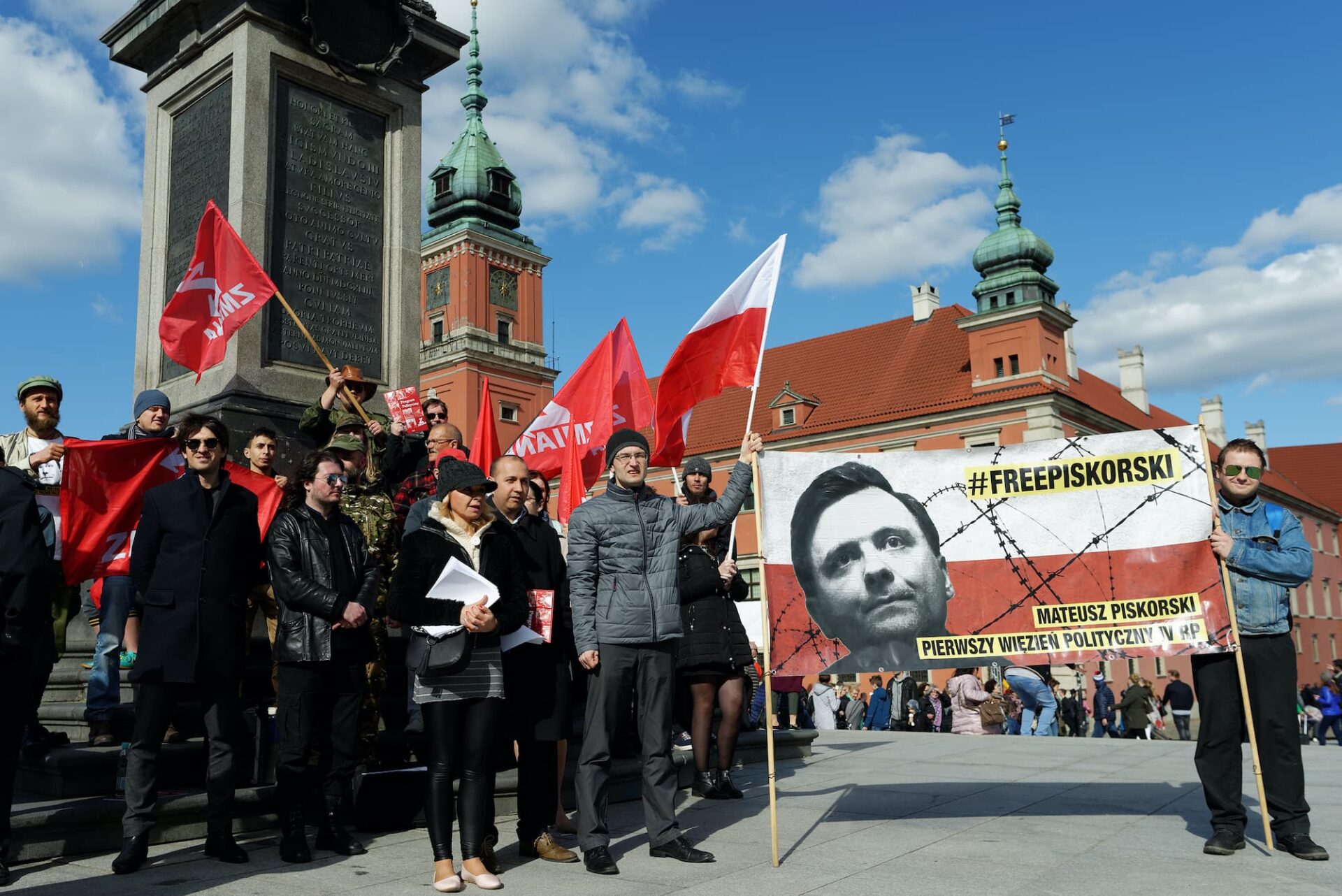
Mateusz Piskorski portrayed as a political prisoner by Zmiana Party on a Labour Day demo. Warsaw, Poland. May 1, 2017 Source: Maciek Markowski / Forum
After spending the last three years in detention thanks to his ongoing espionage trial, today Piskorski is on the sidelines. He has lost his influence over the Polish ECAG: he has no control over the organisation, it is run by other people, and Piskorski himself is kept busy by the Polish secret services and the prosecution office. If he appears in public, it is only on the pro-Kremlin Sputnik or as a hero of niche right-wing portals. Additionally, the German ECAG, which was founded in partnership with Piotr Luczak of the German far-left Die Linker party and has previously boasted of its cooperation with the Russian Central Election Commission, split with the original and became an independent organisation in 2011.
However, as we found out, Piskorski’s links to the recent CAR mission was not simply that of a bystander and he may have maintained closer links with the German ECAG than previously understood.
Informal press agency: Press Tour
Piskorski almost immediately reacted after the scandal broke in HVG, providing a comment to the most prominent pro-government Hungarian daily, Magyar Nemzet, in a matter of hours. In his scathing piece, Piskorski accused Jobbik of “hypocrisy” for penalising Szabó for the same behaviour as Márton Gyöngyösi, the party’s current Executive Vice-President. Our sources made clear that Piskorski’s quick reaction could prove two things: either the Jobbik representatives are under some form of Russian intelligence surveillance and/or Piskorski maintains curiously close relationship with the editors of Magyar Nemzet. Either way, the case proves that the Kremlin has given up on its influence in fringe or small parties such as Jobbik and instead they focus their influence efforts and operations on recruiting individual politicians for their foreign missions.
In addition to the Hungarians, there were two Poles on the 2020 mission: Grzegorz Waliński and Piotr Jastrzębski, who spent three weeks in the Central African Republic, more than the other observers.
Grzegorz Waliński was a colourful character; he was a former journalist and diplomat, including a posting as the Polish ambassador to Nigeria between 2002 and 2008. For years he was a reporter for the left-wing daily Dziennik Trybuna and a member of the board of the Communist Party of Poland. Piotr Jastrzębski is also a former journalist, a non-drinking alcoholic, who wrote about his fight against addiction in a book “Powrót z dna” (“Collected Works. Return from the Bottom”). They are both fascinated by Africa. You can easily find photos of them together with Hungarians in CAR such as this photo in which Waliński is standing with Balázs Szabó.
Their passion is shared by Balázs Szabó, who claimed in the Moszkvater blog’s article published after returning from the mission: “It is no exaggeration to say that the city of Bangui was thriving like a bee on election day. We divided our international team of election observers from Belgium, France, Austria, Macedonia, Germany, Poland and Hungary into groups of two and we all visited different locations. I, as a Polish native speaker, was assigned to a colleague from Poland and together we visited the 270,000-strong town of Bimbo near Bangui. Afterwards our paths [split].”
Piotr Jastrzębski agreed to talk to us about the observation mission and his role in it, which again confirms the Russian modus operandi of these sham election missions:
Question: What was your general impression of the mission?
P.J:: The only people with white skin that I met were those who came under the protection of the French embassy. They came for the announcement of the election results, a pilot and some Russians. Apart from that, I didn’t meet anyone white there. There was me, Grzesiek Walinski and Milenko from Macedonia. For a while, there was also a woman from France and two Hungarian MPs. Balázs Szabó who speaks excellent Polish [confirmed by our Hungarian sources as well – the editors], which surprised me greatly. I met him in a pub and talked to him for half an hour.
Q: You are a left-winger and suddenly there are people from Jobbik, a party that only recently moderated its far-right positions. Didn’t that surprise you?
P.J: They turned up in the same hotel as ours. Which was strange, because all the non-blacks were staying in some other protected French hotel. We were there for over three weeks. So I went around this republic practically wherever I could.
Q: Who sent you on your mission?
P.J.The Europäisches Zentrum für Geopolitische Analyse. During the elections, I drove around the polling stations for two days. I would stop, sit for a while, talk to the workers and then drive on. Well, because sitting in one polling station can always be somehow set up by the locals and I preferred to be surprised like that.
Q: You didn’t see any other irregularities?
P.J: No. I was very surprised by the order that was in those committees, which I visited without notifying them.
Q: Did you have to make any report after you left, after your observations?
P.J: Yes, yes. The report was written down, signed and we sent it to the Europäisches Zentrum für Geopolitische Analyse, local electoral commision and some African organizations.
Jastrzębski says that the mission report was written not in German, as may have been expected given the organising body of the observation, but in French. When we asked Jastrzębski about his work for the German ECAG, he admits that “someone recommended him” to observe the Nagorno-Karabakh elections (also in December 2020 he posted a number of photos to his Facebook page that appear to document a visit to the contested territory). Since then, he has been on several trips on behalf of the German ECAG. According to Jastrzębski, the Europäisches Zentrum für Geopolitische Analyse has recently set up an informal press agency, Press Tour. On its behalf, Jastrzębski has visited Greece and Ukraine. “I write them a note from each trip and send it to them,” says the journalist. The Press Tour media agency does not exist as a formal entity, and it is unclear what the exact purpose of Jastrzębski’s trips have been.
Large pro-Russian network
According to Jastrzębski, it was Piskorski who, in the autumn of 2020, offered him a trip to Africa on an observation mission. Piskorski confirms this version.
In an interview with VSquare for this report, Piskorski revealed that his former association, ECAG, was part of a larger network in which the Europäisches Zentrum für Geopolitische Analyse played a crucial role. According to him, sister organisations in this network were active in France, Austria and Belgium, all with similar names but without formal links between them.
Asked about the sources of funding of the Europäisches Zentrum für Geopolitische Analyse Piskorski replies evasively, stating that associations around the world usually support themselves from three sources: contributions, donations and grants. However, the German ECAG does not publicly disclose its list of donors and declined a request to do so via email. Which is not a surprise given Russia’s direct or indirect involvement in the missions and the pretty significant sums of money needed to run them, as detailed below.
When asked about the Press Tour media agency and Jastrzębski’s trips, Piskorski claimed that he sometimes uses photos provided by Press Tour in his work, such as reporting on the 2020 US presidential election. According to him, the agency does not produce journalistic content, only photos. He claims that it is only possible to access the agency’s work only through a contact on Telegram.
We were unable to establish who finances the agency, how it works or how it can be contacted. Previous Hungarian investigations have confirmed that such “intermediary” organisations often serve as a public front for Russian intelligence or other agencies who are using similar methods in their activities. Thus, the photos, notes or other materials produced by observers for the Press Tour might very-well feed into Russian intelligence or disinformation activities in the Central African Republic or the wider region, even if the Press Tour agency seems to be a ghost organisation with no comprehendible or real function in the public realm.
Piskorski’s connection to the CAR mission might seem quite surprising: although the Polish ECAG was founded for the specific purpose of organising election observation missions, Africa has not been his area of activity. It is possible that this pivot was a response to the significant exposure suffered by the Kremlin’s preferred election observation organisation in Africa, the Association of Free Research and International Cooperation (AFRIC), over the last couple of years.
AFRIC has worked in conjunction with the rest of the Kremlin-backed machinery to draw upon a significant pool of European affiliates and representative for their missions. CAR was not the first time that left-wing Polish journalists and activists had been involved in such a mission. In November 2018, several Polish activists and journalists of the left-wing portal strajk.eu joined a Russian CIS-EMO delegation on a trip to Madagascar to monitor the country’s presidential elections. Maciej Wiśniowski, Małgorzata Kulbaczewska-Figat and Bojan Stanisławski had their travel and accommodation costs paid for by CIS-EMO.
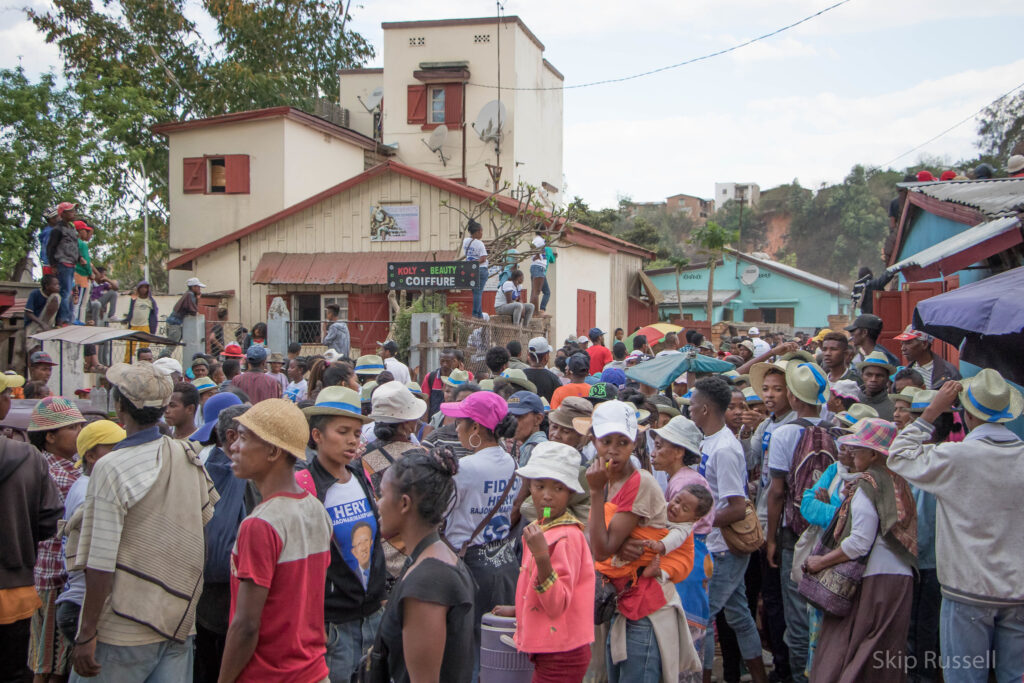
Political rally during the presidential campaign in Madagascar. Photo: Skip Russell (CC BY-NC-ND 2.0)
When interviewed in 2018, Wiśniowski and Kulbaczewska-Figat assured that they had nothing to do with Russian propaganda. “I’m not surprised that a state which has great power ambitions, such as Russia, sends a monitoring mission. Many other countries were interested in the Madagascar elections, including France, the EU, and China. Is the arrival of a monitoring mission a sign that there was election interference?” said Kulbaczewska-Figat. “They invited us, we thought it was an excellent opportunity for us journalists to go to a country where we would never go alone,” she added.
Still, they had no concerns about participating in a mission funded by an organisation linked to the Kremlin: “I do not look at that the way you look at it and I do not accept the narrative that the CIS-EMO and Kochetkov are the Kremlin, Russian money, Putin, and that the strings were pulled by Russian intelligence,” Wiśniowski recounted.
Who pays the bill?
How much does it cost to organise an observatory mission? According to Newsweek Polska weekly missions organised by recognised international actors, such as the OSCE / ODIHR, cost around 1500-3000 euros per “short-term” observer who spends about a week on monitoring elections. CIS-EMO missions in Africa must be more expensive (including flights, food, hotels, interpreters, drivers), not counting management expenses. According to our estimations, at the peak of its activities (in 2005 and 2009-2011), CIS-EMO sent around 100 observers at a time (no official figures are available), which means that over the course of several years, its budget could amount to 12 million euros (between 160,000 and 250,000 euros per mission). It is also possible that CIS-EMO’s expenditure was higher, as much larger delegations were sent to some missions (the presidential election in Ukraine in 2010 was monitored by 566 observers). Some participants recall that working conditions (hotels, food) are very good.
These missions are expensive, and so it is hard to believe that a small German organisation would invest its resources in sending a group of observers to CAR (who it appears did not do much thorough observing) without the initiative of a major backer. The Kremlin’s investment in influence operation in CAR make it an ideal candidate for the kind of bias observation missions and political influence campaigns deployed in South Africa, Madagascar, Mozambique and Zimbabwe by AFRIC. However, the extensive reporting on AFRIC’s activities, culminating in the organisation and key individuals being placed under US sanctions, has led to AFRIC largely disappearing from public sight. Hence, the German ECAG may have been a last minute, low-profile replacement with a significant network of pro-Kremlin election observers to be mobilised on short notice and without asking too many questions.
The influence strikes back
The Kremlin continues to organise election observation missions made up largely of representatives of far-right and occasionally far-left organisations to legitimise pro-Kremlin regimes around the globe.
The network of election observers has evolved and integrated into a global chain in support of Russian political, military or economic interests in Eastern Europe, the Middle East and Africa.
These election observation missions utilise a network of organisations masquerading as independent local NGOs, while under financial influence or direct control of the Kremlin. It’s a core part of the Kremlin influence operations, particulry in Africa where it is run by Yevgeny Prigozhin to assert and cement Russian influence.
Hungarian, Polish or other European far-right or fringe parties and politicians still remain an EU/NATO vulnerability against Russian political or economic influence. They are not only willing servants of the Kremlin’s interests abroad, they also provide Russia with information in the form of confidential reports or publications to be used by the Kremlin’s troll factories or intelligence agencies in their influence operations.
This recent mission from December 2020, organised by the aformentioned Europäisches Zentrum für Geopolitische Analyse to Central African Republic and uncovered by our investigation, is a case in point.
Lóránt Győri and Dominik Istrate from Political Capital Institute contributed to the report in Hungary.
Cover photo: Central African Republic President Faustin Archange Touadera addresses supporters at a political rally as Russian mercenaries, and Rwandan UN peacekeepers stand guard at the stadium in Bangui, Central African Republic, December 19, 2020. Source: STRINGER / Reuters / Forum
Polish journalist, reporter at Superwizjer TVN, since 2016 working with Fundacja Reporterów (Reporters Foundation). Based in Warsaw.
Polish analyst specializing in Eastern Europe. Employed in Esperis Consulting and Political Accountability Foundation. Since 2017 working with Fundacja Reporterów (Reporters Foundation) as an expert.

